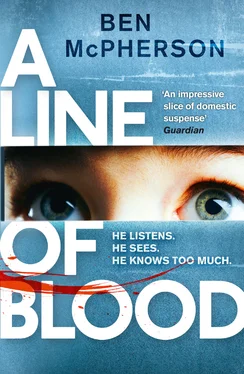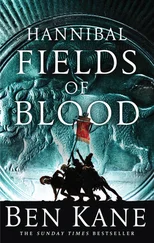Mr Sharpe smiled a benign smile. ‘Of course, it’s summer break soon, and Max will be leaving us in a few short weeks. Was there anything else?’
‘Not unless there’s anything you would like us to address at home,’ I said, surprised that he hadn’t mentioned Max’s swearing.
‘No, as I said, a well-brought-up boy. Nice circle of friends, never in trouble. Studious, but not a prig. Neither a victim nor a bully. He listens in class, he does his homework, he reads well. He will settle well into secondary school life; I have no doubt of it. I’m not really sure what more I can say.’
‘Well parented, you said?’ asked Millicent.
‘Yes, a credit to you and your husband.’
‘He doesn’t seem in any way odd to you?’
‘Dear me, no. Why?’
We didn’t see Max as we left the school.
‘Shouldn’t that man be a country schoolmaster somewhere in the middle of the 1950s?’ I said.
‘I kind of liked him,’ said Millicent.
‘Me too. Strange that Max likes him so much, though.’
‘Kids don’t like teachers who want to hang out; they don’t like for adults to talk about hip hop and social networking. They want to know where the line is, and what will happen when they cross that line. Especially boys. They’re kind of hardwired conservative at that age.’
‘But how does that work here in Crappy?’
‘So many questions, Alex. Aren’t you tired?’
Seventy hours of footage sitting on my computer. Five days to view it.
Across the road from the neighbour’s house an ambulance stood parked. Three police cars boxed in the parked cars on our side of the street.
The door of the house on the other side of ours opened. Mr Ashani, all flower baskets and civic pride. His house was freshly painted, his cream slacks smartly pleated; his smile had God on its side.
‘Mr and Mrs Mercer,’ he said, smiling broadly. ‘We see too little of each other.’
‘Hey, how are you, Mr Ashani?’ said Millicent, offering up her cheek.
‘French style,’ said Mr Ashani. ‘Nice.’ He kissed her briskly, once on each cheek, then held out his hand to me. I tried to grip it as firmly as he gripped mine. ‘Nice,’ he said again. His right eye had the first faint suggestion of cataract clouding its surface, but his skin was flawless. I had once asked him his age, and he had laughed. ‘Oh, you mean the old black-don’t-crack thing, sir?’ I should have asked him again, but I was afraid of appearing rude, or worse.
‘Waiting for the dead man?’ said Mr Ashani.
‘No,’ I said. ‘No, not at all.’
Mr Ashani laughed, coughed a little, and laughed again.
‘Not you, Mr Mercer.’ He nodded towards the ambulance. The crew had the doors open in the London heat, listening to the radio, drinking water from aluminium bottles.
‘I asked them, you see, but they told me nothing. The police have been there two hours. I saw men with metal cases and there were flashes coming from the house. They would not do this if this man were still alive, surely?’
‘You think they’re taking photographs?’ I said.
‘Can you think of any other reason for the flashes, sir?’ he said. ‘We must pray that this is not the beginning of a wave of crime.’
‘No crime was committed, Mr Ashani.’
‘No, my dear?’
‘It appears to be a suicide,’ said Millicent, her voice quiet.
‘No,’ he said. A look of horror passed across his face. ‘What a vile and cowardly thing that would be. We must hope that you are mistaken. We must hope that this is a murder.’
‘Mr Ashani, I can’t believe you would say that.’
‘It is not my wish to offend you, Mrs Mercer.’
‘A man is lying dead in there, Mr Ashani. Surely he deserves our sympathy – your sympathy – however he died.’
Mr Ashani considered this. ‘No, Mrs Mercer,’ he said. ‘No, suicide is the greatest of crimes. To turn one’s back on redemption, to despair in such a way … It is … That you cannot see this … I am at a loss …’
He began to walk back towards his house.
Millicent made to walk after him. ‘Mr Ashani. Please.’
He turned, then very deliberately walked back towards us.
‘I do not wish you to think me cruel,’ he said, ‘but the word on this is very precise, my dear. And besides, this man was not a moral man.’
I tried to move into Millicent’s line of sight. I wanted her to change the subject.
‘Mr Ashani,’ said Millicent, ‘I respect your view, of course I do, but we disagree.’
Mr Ashani began to speak very quietly, his voice grave. ‘With murder there is at least the hope of salvation. The soul of the victim may ascend to heaven, and the murderer may reflect on his crime and repent.’ He turned to me, smiled the most reasonable of smiles. ‘You see this, sir, do you not?’
I gave what I hope was a smile of respect. Mr Ashani nodded, as if I had confirmed his point, turned back to Millicent. ‘With suicide, Mrs Mercer, a soul is forever lost to God. Forever. To choose suicide is to mark your card for damnation. No, Mrs Mercer, no, we must pray that this is a murder.’
I looked at Millicent. Change the subject …
OK. Millicent looked back at me. All right.
‘Mr Ashani,’ she said, ‘my husband and I have been arguing over how old you are.’
He smiled. ‘How old do you think I am?’
‘So our guess was somewhere between fifty …’
‘Fifty? Excellent.’ He laughed.
‘And I guess, and I hope you won’t be offended, but we really didn’t know …’ She screwed up her eyes slightly, touched his hand to show that she meant no harm. ‘Well, we thought upper limit seventy.’
‘Upper limit? That’s your upper limit?’
Millicent nodded. ‘Maybe sixty-seven?’
‘I’m seventy -seven,’ he said, clearly delighted. ‘Fit as the day is young.’
‘My husband worries, you know, Mr Ashani. He thinks maybe you’ll think badly of us for not being able to guess. You have such perfect skin.’
‘No, my dear. No, I am not offended. Other things offend me, perhaps, but not that.’
‘You see,’ she said as I closed the front door behind us, ‘he doesn’t think you’re a racist for not knowing his age.’
‘What did he mean by other things?’
‘Well, I guess maybe he could think that you are a little racist because you don’t engage with his ideas … I mean with anyone else you would just jump right in there, but Mr Ashani gets to believe what he wants about God and suicide and murder, unchallenged by you.’
‘He’s old.’
‘Right … I’m sure that’s why you don’t engage with his views. And why you never invite him round. The guy likes an argument. You can see that.’
‘You think I’m racist?’ And suddenly I could see that she was laughing. ‘So now racism is funny?’
A dull thud, as if someone in the dead neighbour’s house had dropped a sledge hammer. Time stopped. Millicent winced. The air in the room was all dust and heat. Millicent laughed, as if embarrassed by her reaction. Time restarted.
‘No, Alex, no. That isn’t it at all. It’s just … He’s our neighbour, we have nothing in common; you don’t have to invite him round to drink mineral water and talk Nigerian politics.’
Something scraped across the dead neighbour’s upper floor. Millicent’s eyes darted. ‘Whoah,’ she said. ‘That was a little …’
‘… unexpected,’ I said.
‘Unexpected.’ She composed herself. ‘Yeah.’
‘He’s from Ghana,’ I said, ‘and he’s a nice guy.’
‘Only since he found out we were married. Before that he kind of sucked. And by the way, he has strong opinions about Nigeria.’
Читать дальше












